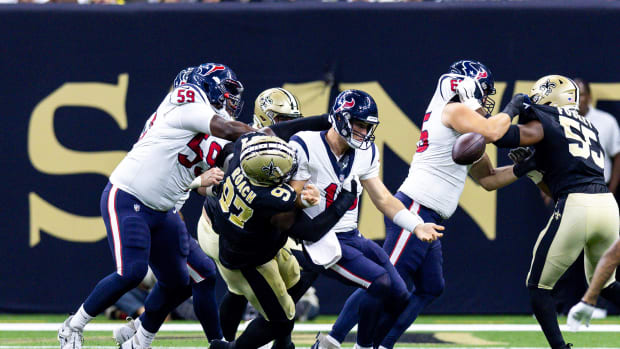What legal impact could the potential discovery of CTE in Aaron Hernandez's brain have?
Did Aaron Hernandez suffer from Chronic Traumatic Encephalopathy, better known as CTE? Would a CTE diagnosis excuse Hernandez, or at least make him less blameworthy, for committing crimes that included first-degree murder? Would a CTE diagnosis enable Hernandez’s daughter to successfully sue the NFL in a wrongful death lawsuit—with the “wrongful death” in question not being those who Hernandez killed or allegedly killed but rather himself?
During a press conference on Thursday, Hernandez’s attorney, Jose Baez, revealed that Hernandez’s family intends to donate Hernandez’s brain to Boston University’s CTE research project. Later on Thursday, Worcester (Mass.) District Attorney Joseph Early, Jr. released a statement indicating that Hernandez’s brain has been released to the CTE project.
The researchers have collected over 200 brains for the study of CTE, a degenerative neurological condition that is associated with repeat head trauma and that is only diagnosable with certainty as part of a post-mortem exam. To date, 94 deceased NFL players have donated their brains and 90 of those brains reveal the presence of CTE. As I discussed in regards to the NFL’s concussion settlement with former players, the failure of the settlement to fund CTE diagnoses is one of the major critiques of the settlement. The settlement is also now active, as registration for it began on Mar. 23, 2017.
Baez wanted to see the brain donation happen quickly, and this was not surprising since timing for a brain donation is critical. The National Institutes of Health’s NeuroBioBank indicates that a brain donation “must be performed within 24 hours from the time of death in order to ensure optimal preservation of the tissue and maximize the research value.”
Aaron Hernandez no longer had the option to live the life he wanted to live
Generally, the state medical examiner’s office has the right to retain custody of a body and its organs while it investigates cause of death. This right is particularly important in a potential criminal matter. Although prison authorities say that Hernandez committed suicide, an examination of Hernandez’s body would help to confirm or dispute such a conclusion. Ordinarily, a medical examination takes between 24 and 48 hours to conduct.
In a statement released at about 4 p.m. ET on Thursday, the state’s chief medical examiner, Dr. Henry Nields, confirmed that the examination of Hernandez’s death had been completed. Dr. Nields also confirmed that Hernandez committed suicide by hanging himself and that no other person played a role.
Nields’s examination is crucial given that representatives for Hernandez have expressed doubt that the former New England Patriot would kill himself. Their comments suggest that Hernandez might have been killed or perhaps that his suicide was not entirely volitional. As I detailed on Wednesday, Hernandez’s family could potentially sue the prison under the Eighth and Fourteenth Amendments to the U.S. Constitution. Both the quality in which Hernandez’s medical examination was conducted and the examination’s result (suicide without the involvement of others) would constitute significant evidence in any lawsuit by Hernandez’s family against the prison.
Potential legal impact if Hernandez’s brain reveals CTE
Assuming Hernandez’s brain is studied for the presence of CTE, a CTE diagnosis would obviously not relieve him of the responsibility of murdering Odin Lloyd, or committing other crimes. CTE does not “cause” people to commit murder. Along those lines, other athletes whose donated brains exhibit CTE were not convicted of murder.
That said, a CTE diagnosis might help to explain Hernandez’s aberrant behavior. Symptoms associated with CTE include aggression, anxiety and paranoia. Witnesses in both murder trials described Hernandez as deeply mistrustful of others and at times unable to distinguish fantasy from reality. A CTE diagnosis would not solve the riddle of why Hernandez would throw away a very promising NFL career for a criminal life, but it might provide one important clue.
Aaron Hernandez Saga Won’t Affect How NFL Sees Players
A CTE diagnosis might also be used by Hernandez’s estate to defend against civil lawsuits filed by family members of Hernandez’s victims and alleged victims. As explained on Wednesday, those civil lawsuits will likely be impaired to some extent by Massachusetts recognizing “abatement ab initio,” a legal principle that dictates that if a convicted defendant dies before his or her appeals have been resolved, the conviction is vacated. Victims’ family members, who can contest the imposition of abatement in court, can sue Hernandez’s estate regardless of whether he has a criminal record. Those lawsuits, however, would have been strengthened by the presence of related criminal convictions. Hernandez’s estate being able to argue that CTE diminished Hernandez’s culpability would bolster the defense.
Possibility of Hernandez’s family filing a wrongful death lawsuit against the NFL
It is also possible that a CTE diagnosis would lead to Hernandez’s next of kin to consider the possibility of suing the NFL for wrongful death. In the aftermath of former San Diego Chargers star Junior Seau committing suicide in 2012, Seau’s family sued the NFL for wrongful death. The family claimed that CTE led Seau to kill himself and that the NFL hid from Seau the dangers of repeat neurological trauma. In 2014, Seau’s family opted out of the then-pending NFL settlement. By opting out, the family could continue to sue the league (if family members had instead remained part of the settlement, they would have received financial compensation in exchange for voluntarily dismissing the lawsuit).
Does the NFL concussion settlement extend to Hernandez and, by extension, his family? If the answer is yes, then Hernandez’s family may be barred from pursuing a wrongful death lawsuit and would instead need to pursue a claim through the settlement. If the answer is no, then Hernandez’s relatives would not be barred from suing the NFL for wrongful death.
The settlement class consists of all living NFL players (as of a couple years ago) who prior to July 7, 2014 formally or informally retired from the NFL or who were not under contract and not seeking active employment. There is no indication that Hernandez formally retired from the NFL at any point or that he or his family sought benefits from the settlement.
Aaron Hernandez's suicide leaves legal loose ends from his final years
Whether Hernandez “informally” retired by virtue of his murder prosecutions is less clear. Hernandez was arrested for the murder of Lloyd on June 26, 2013, an arrest that led to his immediate incarceration, and the Patriots cut Hernandez that same day. Hernandez remained in prison for the rest of his life, during which time he experienced other significant legal developments—most notably, Hernandez would be charged for the murders of Daniel de Abreu and Safiro Furtado on May 15, 2014 and convicted of Lloyd’s murder on Apr. 15, 2015.
While incarcerated it would have been impossible for Hernandez to seek active employment. However, given that Hernandez had not yet been convicted of Lloyd’s murder as of July 7, 2014—the key date for the settlement class—it’s at least theoretically plausible that he could have returned to the NFL at some later date. To be sure, it would have required him to defeat two sets of murder charges and accompanying charges. He would have also faced suspension from the NFL and likely little to no interest from any NFL teams. But other players, such as Michael Vick, have returned to the NFL post-incarceration. Hernandez was also only 27 years old when he was acquitted for the murders of de Abreu and Furtado.
Even if a wrongful death lawsuit for Hernandez’s death wouldn’t be preempted by the concussion settlement, it would face very long odds. A court would likely reason that Hernandez’s decision to commit suicide reflected his own choosing. Also, regardless of whether CTE made it more likely that Hernandez committed suicide, it is not clear that the NFL unlawfully “caused” Hernandez to suffer from CTE during his three years in the league. Hernandez’s brain was also impacted by his prior experience playing football in college and high school.
One thing is for sure: the Aaron Hernandez story continues to take unusual steps.
Michael McCann is SI’s legal analyst. He is also an attorney and a tenured law professor at the University of New Hampshire School of Law.




































